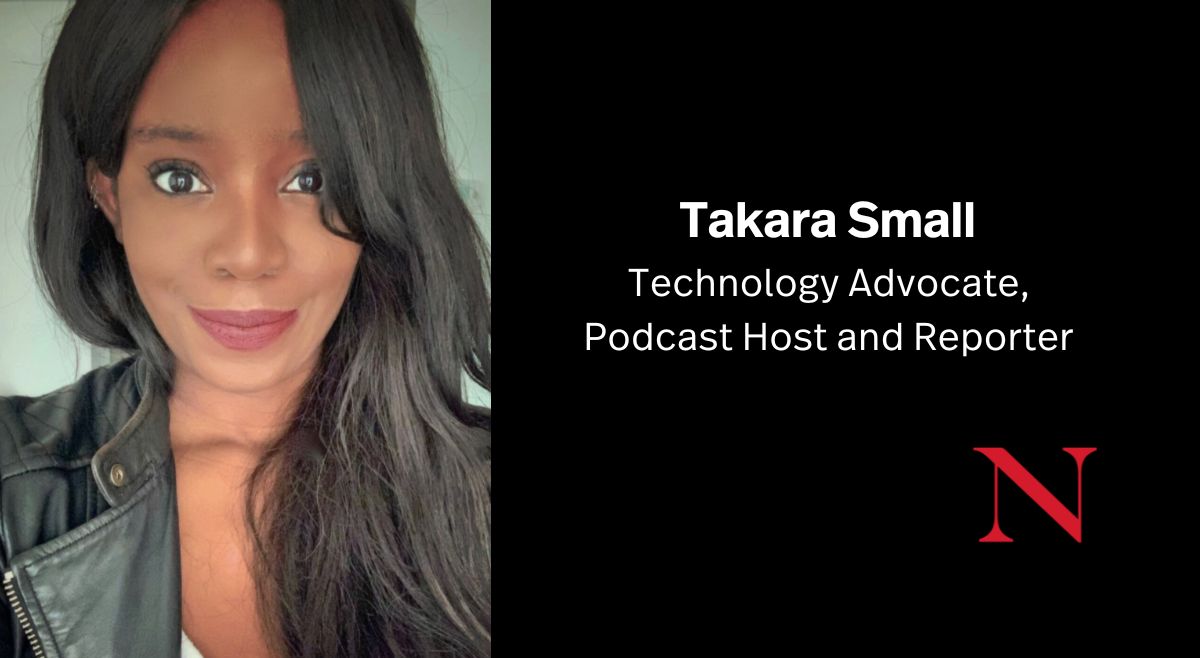Five Questions With Takara Small

Takara Small is a technology reporter, podcast host, and advocate for access to tech skills for underserved communities. She’s also the founder of the non-profit organization VentureKids Canada — a key partner of Northeastern’s Toronto campus. The partnership has produced two successful summer programs in which youth from underserved communities learned coding, business skills, and the fundamentals of artificial intelligence from industry professionals.
As part of Black History Month, Takara is partnering with us to moderate a virtual panel on February 27. The panel will focus on technology, education, and advocacy in the Black diaspora and BIPOC community. Ahead of the event, we asked Takara five questions about equality, diversity, and inclusion in tech and access to tech education.
What are some of the issues young people in the BIPOC community face regarding access to tech education?
Some of the biggest issues include basic things, like access to devices. A lot of devices are quite expensive, and purchasing refurbished equipment isn’t always possible. Another issue is young people not having opportunities to understand tech fundamentals. There is a lot of paid after-school programming that parents can sign their kids up for. But if you don’t have the financial security to enroll your kids, it makes it hard to take advantage.
What are some ways in which those barriers can be removed?
I’m going to use an example I encountered at university. There were a lot of really great discounts you could get with your student card. So, I think offering opportunities like that for students to purchase goods would be a really good first step. I know our public school system is under a lot of pressure but there are schools that provide free lunch or breakfast programs. If there was a similar program to help students access laptops, tablets, or other devices through a library loan system, that would also go a long way.
I am also seeing a lot of local tech groups that are solely dedicated to introducing Black, Indigenous, or people of colour to the industry or partnering them with mentors. That is crucial.
Our mission with VentureKids, for example, is to provide tech education support to students living in low-income or underserved communities. We provide classes where students can learn from people in the industry, we lend out tablets and laptops, and we give away food boxes from a local company that sources all of its food from farmers. You can’t learn on an empty stomach.
These are solutions that you can’t just implement tomorrow. It takes a lot of time, planning, and support.
Why is it important to provide access to tech skills to underrepresented communities?
The tech industry still isn’t very diverse. If the people who are making the apps, the programs, the technology that we use don’t look like the customers who are using it, that’s a recipe for disaster. So, we need to make sure that the younger BIPOC community understand how it’s used, how it’s built, and if they want, how to build their own or contribute to building tech.
It’s also really important for young people in the BIPOC community to understand these fundamental skills because they interact with tech on a daily basis. Even if people from underrepresented communities don’t go into the tech industry, having these skills matters when it comes to finding long-term employment in any field. Whether you’re in fashion or in the food industry, you’re going to come into contact with tech.
How does the practice of diversity, equity, and inclusion help to build stronger communities?
Representation, which occurs through diversity, provides you with a potential pathway that you could follow. Seeing someone who looks like you, comes from your community, and maybe shares your background may inspire you to go on and accomplish the same thing that person did. If there’s someone who looks like you in a role you envision yourself one day occupying, you can reach out to them to find a mentor who will understand the challenges that you’re going to face in your career. The more empowered people feel, the stronger the community becomes — and representation plays an important role.
Also, when we talk about diversity and inclusion, it’s often framed as a feel-good thing, nice-to-have that people should support. But I always like to share that, in business especially, investing in diversity and training young people from underrepresented communities will help companies to better understand a global customer base.
What are your favourite podcasts right now?
I have to say my podcast, They Did That. It’s a weekly podcast with Sony Entertainment.
It’s all about looking at people who built our world, and some of its greatest inventions, who were either deliberately ignored or overlooked. So, by introducing the public to these scientists, entrepreneurs, artists, and others, we hope they understand that the history we know and love isn’t complete.
I also love a podcast called The Business of Fashion. In addition to the fashion element, they bring in many other aspects to offer a fuller picture of business. It’s kind of an entryway to learning about business as a whole. There is also a podcast called Lives Less Ordinary. I love that series because they talk to amazing people around the world who have lived really interesting lives.
Join Takara on February 27, as she leads a virtual panel discussion about how education and advocacy can help create equity in the Black diaspora and BIPOC community. We are excited to welcome US Consul General in Toronto, Susan R. Crystal, who will make opening remarks and the following esteemed panellists:
- Karl Reid, Senior Vice Provost and Chief Inclusion Officer, Northeastern University and PI and Sustainability Leader, Engineering PLUS Alliance (NSF INCLUDES Alliance)
- Kareen Onyeaju, DEI and People Operations Leader
- Hilda Firempong, Wellness Specialist, Northeastern University in Toronto
Please register and join the conversation on February 27 from 12 and 1 pm ET.




